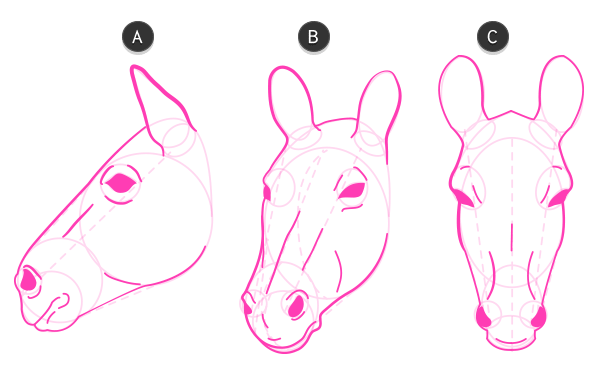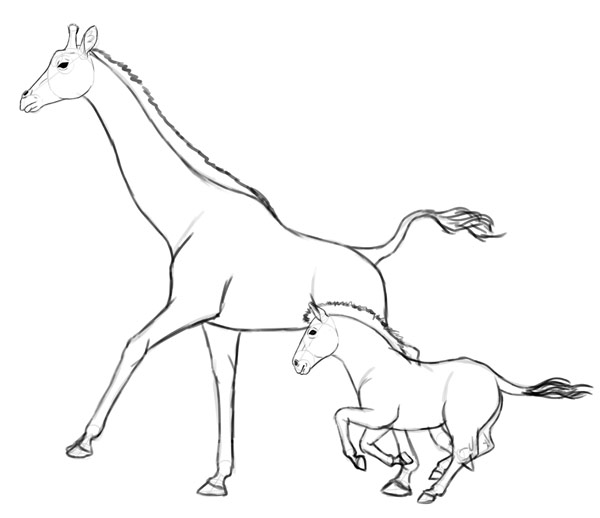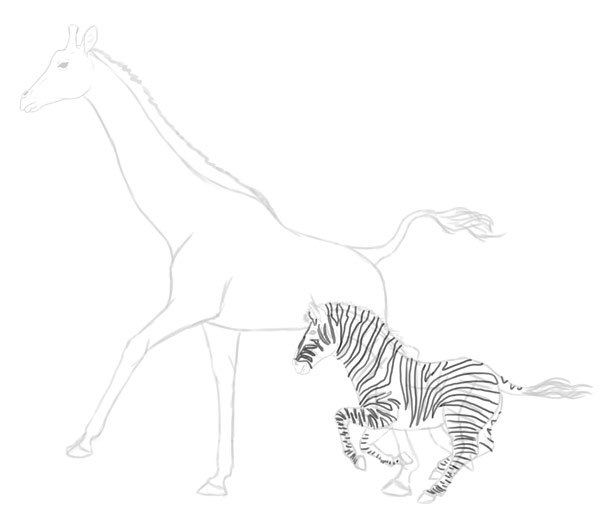
Today we're visiting Africa to learn about two unique species: the zebra and the giraffe. To draw them properly we need to understand that the zebra isn't just a striped horse, and that the giraffe isn't a camel-leopard hybrid. As always, we're going to take a look at their anatomy and learn about every little detail of them.
How to Draw a Zebra
General Anatomy: Horse vs. Zebra
We tend to think of zebras as striped horses, and it's not far from the truth. Horses and zebras belong to the same family and share a lot of features. I've already written a complex tutorial about drawing horses, and some information from there will be relevant here, too. However, it's necessary to define the differences, since they'll make your zebra a true zebra instead of a "striped horse".
This is a zebra in the form of a simplified skeleton. How is it different from a horse?

It's usually said that zebras are smaller than horses, which isn't always true, considering there are so many different horse breeds. It's better to think of a zebra as more heavily built, with a visibly rounded belly, shorter legs, and a bigger head. The neck itself isn't much thicker (though it's surely stronger), but the stiff mane makes it look so. Actually, zebras are closer in look to donkeys than to horses!


Keeping this in mind, you can use my tutorial about horses to learn how zebras move (they use the same gaits as horses), and to apply musculature to the skeleton. You can also use the parts about hooves, eyes, and muzzle. However, there are still some features left!
Zebra Head
Step 1
We're going to work on three views at the same time: side (A), three quarters (B), and front (C). This way you'll better understand the 3D construction of it.
Start with two side-flattened balls.

Step 2
Add a smaller ball for the mouth. Use it as a starting point for the nostrils, and then lead a line from them to locate the eyes. The eye is placed in an egg-shaped "bulge".

Step 3
Add a "cap" for the head to give the proper shape to the skull, and then attach the ears.

Step 4
Use the previous guide lines to draw the head.

Zebra Ears
Step 1
Zebra ears are very horse-like, except they're bigger and rounder. This difference is more prominent in front view (A) than in side view (B). The ears can move in almost every direction, so you can use the pose that you like the best, no matter in which pose the rest of the head is.

Step 2

Step 3

Step 4

Zebra Mane and Tail
After the distinctive pattern, the mane and tail of the zebra are what differentiates them from horses. The mane is stiff and Mohawk-like, and the fluffy tail begins somewhere in the middle, not at the base like with horses. Still, it's not a lion-like tuft—just a shorter horse tail!

Step 1
Before you start drawing the mane, you need to have the line of the neck well defined. The mane starts between or right over the shoulder blades, and ends on the forehead, not far from the ears.

Step 2
The mane is mostly straight and even, with two exceptions: it's a bit shorter towards the back, and it "bends" towards the forehead.

Step 3
Add lines of equal length along the neck line.

Step 4
If you connect the tops of the lines, you'll get the line of the mane.

Step 5
The mane is thick, so we need to add some width. Define the width for a few places first.

Step 6
Then you can use them as guide lines to draw the mane.

If you draw a mane in a close up view, it's important to know it's made of stiff tufts, not stiff hair. These tufts tend to "break", showing gaps in places where the neck is strongly bent.

Zebra Pattern
Step 1
Contrary to popular belief, zebras are black with white stripes. This scientific information doesn't matter for us, though, since in this case it's easier to paint black stripes on white.
When adding a pattern to your zebra, you need to consider the direction first. For all species the stripes go like this:

Step 2
Then you need to adjust the stripes to the body. Keep in mind that:
- The stripes are the thickest at the back.
- The stripes get very thin and dense towards the bottom.

Step 3
Finally, you need to adjust the stripes to the actual species. Let's take a look at two popular zebras.
Plains Zebra
- The mouth is very dark.
- Sometimes brownish "shadow" stripes appear between the black stripes.
- The stripes curl up under the belly.
- The tail is black.

Grévy's Zebra
- The mouth is more grayish.
- The head is bigger and heavier.
- The mane goes far beyond the shoulder blades.
- The stripes are thin and dense.
- The belly is visibly white and stripeless.
- The tail is white, with a dark underside.

It's important to pay attention to the head:

How to Draw a Giraffe
General Anatomy
Although the giraffe looks like an extraordinary animal, it's actually constructed quite typically. If you compare it to a horse or cow, the only differences are its very long legs and neck, and the short torso.
In fact, giraffes are more closely related to cows than to horses, so this time, instead of supporting yourself with horse anatomy, feel free to take a look at my bovine tutorial.

Let's simplify it for our purpose:

Because the structure of the skeleton isn't much different than that of a cow or a horse, you can safely use the musculature diagram from my cow tutorial and only adjust it to the skeleton. Giraffes, though strong, are not very muscular in look, so there's no need to memorize the muscles—use them only to understand how they build the body.

Giraffe Head
Step 1
Again, we're going to take care of three views at the same time: side (A), three-quarters (B) and front (C).
Start with a big, side flattened ball, and attach one small ball and a half ball to it.

Step 2
Add the nostrils.

Step 3
Lead a line from the nostrils to find places for the eyes and ears.

Step 4
Add a "cap" at the tip of the head, and add the "alien antennae" on it.

Step 5
Add an "egg" in the middle of the forehead.

Step 6
Finish the sketch.

Giraffe Eyes
When giraffes feed on thorny acacia trees, their eyes are protected by big, protruding ridges (over the upper eyelid), thick eyelashes and eyelids. Apart from this, their eyes are not so much different from bovines. Their pupils are horizontal, too, but because the irises are very dark, you don't need to include them in your drawing at all.

Giraffe Ears
The ears are very bovine-like, too, except that they're more narrow and slender.

Giraffe Horns
Giraffes have three "horns" on their heads, which are actually bony protuberances called ossicones. There's a pair of long ones, and a single hump in the middle (the "egg" we were adding to the sketch of the head). The long ones have a bunch of dark hair at the top, but it's more prominent with females. Males often have the very tips bald.

Giraffe Hooves
The hooves are very cow-like, except they don't have any "dew claws".

Giraffe Mane and Tail
The mane on a giraffe's neck is stiff, but not very tall. It's more even than a zebra's, but it still has a certain width. You can use the "zebra" method to draw it. The tail is usually darker than the mane, and it looks like a horse tail, too.

Giraffe Pattern
The "spots" of the giraffe only look like a leopard's from a distance. They're actually more like cracks. Their color and density vary across species or even specimens, but the general rule for them stays the same:

Practical Exercise: Draw a Zebra and a Giraffe Step by Step
Let's see how to use this information to create a picture.
Step 1
Start with a very loose sketch of your idea. The more experienced you are, the more accurate this sketch will be, but you don't really need to care about it now.


Step 2
Adjust the simplified skeleton of the animal to the sketched pose.


Step 3
Prepare guide lines for the details.

Step 4
Build the body by simply connecting the parts.

Step 5
Add the details.

Step 6
Sketch the direction of the stripes on the zebra's body.

Then draw them using the guide lines. You can use a reference to create an interesting pattern.

Step 7
When it comes to the giraffe, the guide lines for the patches will be the same as for cracked ground.

Create the patches by adding distance between them. The size of the cracks depends on the species.

Step 8
The sketch is done! You can now clean it up and add some colors.


That's All!
I hope you had fun! Make sure to check my profile for more animal tutorials.





